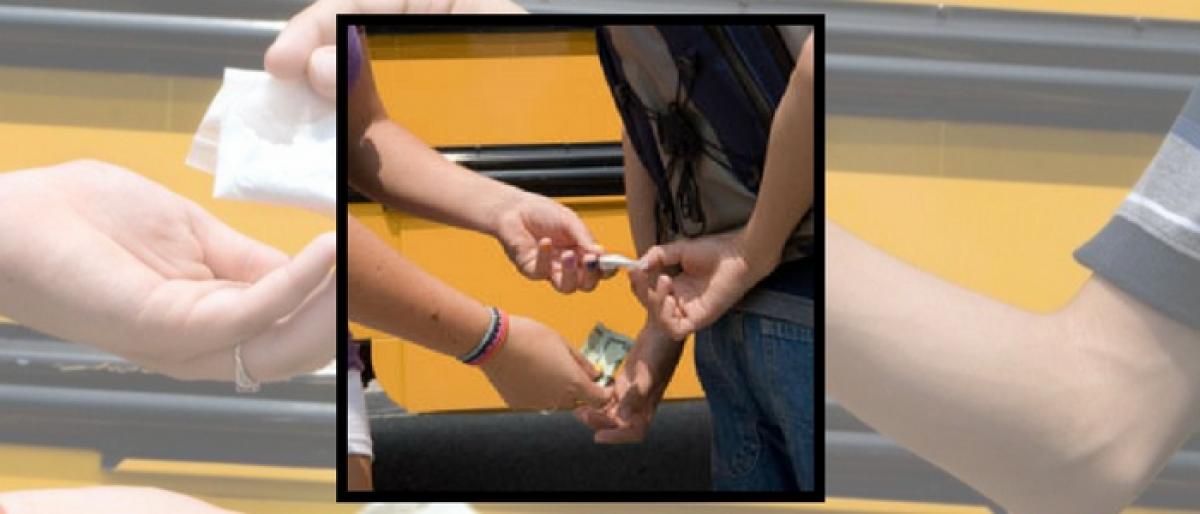Drug cartels not on police radar

Notwithstanding the frequent drug busts by the police and Prohibition and Excise departments, international drug dealers are finding Telangana State as a lucrative market. What is more worrying is that the menace has now made inroads into over 50 educational institutions, multi-national companies and film industry and has even spread to some districts like Nizamabad.
Hyderabad: Notwithstanding the frequent drug busts by the police and Prohibition and Excise departments, international drug dealers are finding Telangana State as a lucrative market. What is more worrying is that the menace has now made inroads into over 50 educational institutions, multi-national companies and film industry and has even spread to some districts like Nizamabad.
There are several organised drug cartels operating in Hyderabad due to lack of coordination between enforcement agencies and lack of resolve to fight the growing menace due to various reasons.
Organised drug cartels have made Hyderabad their base since 2000, but the enforcement agencies have miserably failed to foresee the consequences and remained silent spectators, in a way helping the cartels have a free run.
The activities of organised drug ring on a largescale first came to light when city police arrested five persons, including a deputy superintendent of police attached to the Greyhounds in 2000. The drug ring had links to Mumbai underworld.
According to an officer, who headed the narcotics wing in the Crime Investigation Department (CID) in combined Andhra Pradesh, fighting drugs has never been a priority for the police and the Prohibition and Excise departments.
A former director general of police told The Hans India that police have always been occupied with counter-terror operations, law and order issues and handling traditional crimes. Faced with serious staff crunch, immediate focus of the police was always on containing traditional crime and counter terror operations.
Top brass always felt fighting drugs was the job of Prohibition and Excise, Anti-Narcotics Wing of the CID and the Narcotics Control Bureau (NCB), the former DGP said and hence it was never a priority for the police, the former DGP said.
Echoing the same opinion, an intelligence officer said that they were busy handling Maoists then and now they are more into providing intelligence inputs into the activities of various political parties. “We have never been asked to look into drug cartels,” the officer said on condition of anonymity.
The NCB officials say that they have a small set up in the state headquarters to guide the state police and train the local police in handling narcotics cases. The menace cannot be tackled unless there is a perfect coordination between the local police, Prohibition and Excise, Anti-Narcotics Cell of the CID, the officials added.
In the absence of it, some lower and middle level officials in the enforcement agencies look at it as an opportunity to make quick buck by facilitating the drug cartels through different methods, the officials aver.
Sources said that an anti-narcotics task force headed by an officer of the rank of Inspector General should be constituted. There is also a need for a state-level coordination committee under the chairmanship of Chief Secretary. But nothing of that sort has been happening in the state. Instead, city police occasionally catch some Nigerians and they are put behind bars without going deep to track the origin of the drugs and crack the entire drug cartel.
Some efforts, however, were made when A K Khan was the city police commissioner and Stephen Ravindra was the west zone deputy commissioner of police. During his stint, Khan had opened an exclusive anti-narcotics cell in the city police with some infrastructure.
However, subsequently the anti-narcotics cell has become toothless. This has led the Nigerian drug peddlers languishing in prisons come in touch with local criminals and spread their network, a senior police officer said. The latest drug bust by the prohibition and excise department is only a tip of the ice berg, he said.








